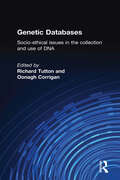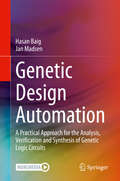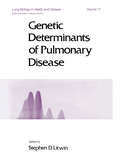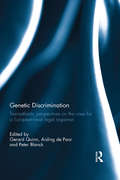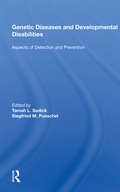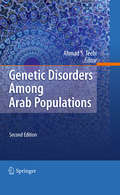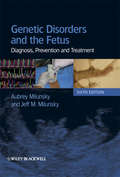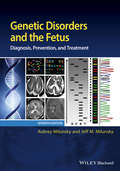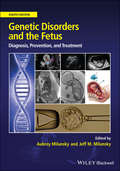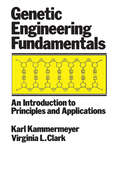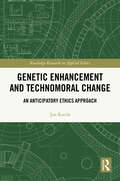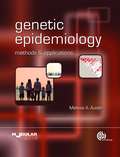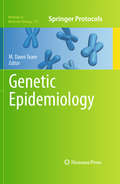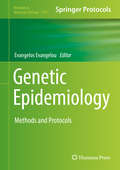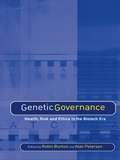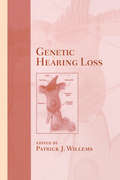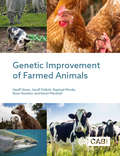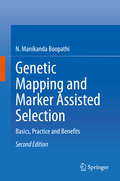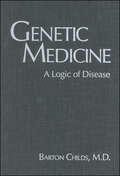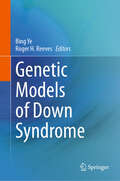- Table View
- List View
Genetic Damage in Human Spermatozoa
by Monica Muratori Elisabetta BaldiThere are several types of damage that can be found in the male gamete. Genetic damage in spermatozoa can originate during spermatogenesis, or it can originate during transit in both male and female genital tracts. Damage can also be due to ageing, environmental or iatrogenic conditions, as well as to the protocols to cryopreserve and to select spermatozoa in assisted reproduction techniques. The purpose of this book is to provide a comprehensive resource for all possible DNA damages in sperm, the relation to fertility and infertility, and possible transgenerational heritable effects.
Genetic Damage in Human Spermatozoa (Advances in Experimental Medicine and Biology #1166)
by Monica Muratori Elisabetta BaldiThere are several types of damage that can be found in the male gamete. This book covers the genetic damage in spermatozoa that can originate during spermatogenesis, or during transit in both male and female genital tracts. Damage can also be due to ageing, environmental or iatrogenic conditions, as well as to the protocols to cryopreserve and to select spermatozoa in assisted reproduction techniques. The purpose of this book is to provide a comprehensive resource for all possible DNA damages in sperm, the relation to fertility and infertility, and possible transgenerational heritable effects.
Genetic Data and the Law
by Mark TaylorResearch using genetic data raises various concerns relating to privacy protection. Many of these concerns can also apply to research that uses other personal data, but not with the same implications for failure. The norms of exclusivity associated with a private life go beyond the current legal concept of personal data to include genetic data that relates to multiple identifiable individuals simultaneously and anonymous data that could be associated with any number of individuals in different, but reasonably foreseeable, contexts. It is the possibilities and implications of association that are significant, and these possibilities can only be assessed if one considers the interpretive potential of data. They are missed if one fixates upon its interpretive pedigree or misunderstands the meaning and significance of identification. This book demonstrates how the public interest in research using genetic data might be reconciled with the public interest in proper privacy protection.
Genetic Databases: Socio-Ethical Issues in the Collection and Use of DNA
by Richard Tutton Oonagh CorriganGenetic Databases offers a timely analysis of the underlying tensions, contradictions and limitations of the current regulatory frameworks for, and policy debates about, genetic databases. Drawing on original empirical research and theoretical debates in the fields of sociology, anthropology and legal studies, the contributors to this book challenge the prevailing orthodoxy of informed consent and explore the relationship between personal privacy and the public good. They also consider the multiple meanings attached to human tissue and the role of public consultations and commercial involvement in the creation and use of genetic databases. The authors argue that policy and regulatory frameworks produce a representation of participation that is often at odds with the experiences and understandings of those taking part. The findings present a serious challenge for public policy to provide mechanisms to safeguard the welfare of individuals participating in genetic databases.
Genetic Design Automation: A Practical Approach for the Analysis, Verification and Synthesis of Genetic Logic Circuits
by Jan Madsen Hasan BaigThis textbook introduces readers to the recent advances in the emerging field of genetic design automation (GDA). Starting with an introduction and the basic concepts of molecular biology, the authors provide an overview of various genetic design automation tools. The authors then present the DVASim tool (Dynamic Virtual Analyzer and Simulator) which is used for the analysis and verification of genetic logic circuits. This includes methods and algorithms for the timing and threshold value analyses of genetic logic circuits. Next, the book presents the GeneTech tool (A technology mapping tool for genetic circuits) and the methods developed for optimization, synthesis, and technology mapping of genetic circuits. Chapters are followed by exercises which give readers hands-on practice with the tools presented. The concepts and algorithms are thoroughly described, enabling readers to improve the tools or use them as a starting point to develop new tools. Both DVASim and GeneTech are available from the developer’s website, free of charge. This book is intended for a multidisciplinary audience of computer scientists, engineers and biologists. It provides enough background knowledge for computer scientists and engineers, who usually do not have any background in biology but are interested to get involved in this domain. This book not only presents an accessible basic introduction to molecular biology, it also includes software tools which allow users to perform laboratory experiments in a virtual in-silico environment. This helps newbies to get a quick start in understanding and developing genetic design automation tools. The third part of this book is particular useful for biologists who usually find it difficult to grasp programming and are reluctant to developing computer software. They are introduced to the graphical programming language, LabVIEW, from which they can start developing computer programs rapidly. Readers are further provided with small projects which will help them to start developing GDA tools.
Genetic Determinants of Pulmonary Disease
by Stephen. D. LitwinThis book provides a current and integrated approach to the subject of genetic determinants of pulmonary disease with emphasis on physiologic derangements and genetic mechanisms. It describes the epidemiologic-genetic approach to chronic pulmonary disease.
Genetic Discrimination: Transatlantic Perspectives on the Case for a European Level Legal Response
by Peter Blanck Gerard Quinn Aisling De PaorAs genetic technologies advance, genetic testing may well offer the prospect of detecting the onset of future disabilities. Some research also forwards that certain behavioural profiles may have a strong genetic basis, such as the determination to succeed, or the propensity for risk-taking. As this technology becomes more prevalent, there is a danger that genetic information may be misused by third parties and that particular genetic profiles may be discriminated against by employers, by providers of social goods and services, such as insurance companies and even by educational facilities. This book explores the different forms and potential uses of genetic testing. Drawing together leading experts in disability law, bioethics, health law and a range of related fields, it highlights the ethical and legal challenges arising as a result of emerging and rapidly advancing genetic science. On examining transatlantic perspectives on the matter, chapters in the book ask whether the US Genetic Information Nondiscrimination Act (GINA) is proving to be an effective tool in addressing the issue of genetic discrimination and alleviating fears of discrimination. The book also reviews what insights may be gained from GINA within employment and health insurance contexts, and asks how the UN Convention on the Rights of Persons with Disabilities (CRPD) may impact similar debates within the European Union. The book focuses particularly on the legislative and policy framework in the European Union, with an emphasis on the gaps in protection and the scope for specific legislative action in this area. This book will be of great interest to scholars and students of discrimination law, bioethics and disability law, and will be of considerable use to legal practitioners, medical practitioners and policy-makers in this area.
Genetic Diseases And Development Disabilities: Aspects Of Detection And Prevention
by Tamah L SadickAdvances in medical genetics during the past two decades have made possible the detection and prevention of many genetic disorders and developmental disabilities. The emphasis of this book is on the application of these new developments to real-life situations. Covering homozygote newborn screening, heterozygote detection in the community, and pren
Genetic Disorders Among Arab Populations
by Ahmad S. TeebiArab populations have their "own" genetic disorders, both universal and particular. Genetic diversity within these source populations, along with the fact that the rates of inbreeding are often high and family sizes are often large, constitute conditions that facilitate the emergence and detection of phenotypes explained notably by autosomal recessive inheritance; in which case, the use of homozygosity gene mapping can facilitate the discovery of the corresponding genes. The present book includes 5 parts dealing with various aspects that relate to the genetic structure of Arabs and minorities within the Arab world as well as genetic disorders prevalent in this part of the world. It includes updated reviews of the genetic disorders in various Arab countries and geographic regions. The focus is primarily, but not exclusively, on the group of single-gene disorders with particular emphasis on autosomal recessive conditions. It further includes epidemiological and clinical data as well as inheritance patterns, mutation and polymorphism data, and available haplotype analysis data. The ethnic and genetic diversity of the Arab populations is discussed as well as aspects of genetic counseling practice in this region together with a proposal for an ethical framework for genetic research and prevention of genetic disorders. The target audience of this book includes human and medical geneticists, genetic counselors, researchers, medical specialists dealing with Arab patients or practicing in Arab countries, medical and genetic counseling students, and nurses.
Genetic Disorders and the Fetus
by Jeff Milunsky Aubrey MilunskyHighly Commended in the Obstetrics and Gynaecology category of the 2010 BMA Medical Book CompetitionBrand new edition of the world's leading text on prenatal diagnosisThis 6th Edition of Genetic Disorders and the Fetus maintains it's pre-eminence as the major repository of facts about prenatal diagnosis. It provides a critical analysis and synthesis of established and new knowledge based on the long experience of authorities in their respective fields. A broad international perspective is presented through authoritative contributions from authors in 11 countries. All chapters and guidelines have been updated to reflect contemporary practice. New chapters have been introduced on:The use of chromosomal microarrays in prenatal diagnosisThe social, legal and public policy issues with special reference to international approachesThe important peroxisomal and related fatty acid oxidation disordersExtensive tables and clear illustrations assist in differential diagnosis, gene identification and diagnostic modes. The recognition of many new and unresolved challenges should provide inspiration for novel research initiatives. The guidance provided and the insights and perspectives of these authors make this volume a valuable and indispensable resource for all whose focus is securing fetal health through prenatal diagnosis.Genetic Disorders and the Fetus: Diagnosis, Prevention and Treatment is an essential resource for all engaged in prenatal genetic diagnosis, especially obstetricians, maternal-fetal medicine specialists, medical geneticists, genetic counsellors, and pediatricians, but also many other specialties.
Genetic Disorders and the Fetus
by Aubrey Milunsky Jeff M. MilunskyProfessor Milunsky's book has been at the forefront of this field for over 30 years, in sixeditions. The new edition will continue to be written by internationally recognized authorities in the field. The contents will be updated to include the major changes afoot in the cytogenetics of prenatal diagnosis where chromosomal microarray has taken hold and is likely to seriously replace routine chromosome analysis. This aspect, enormous advances in prenatal molecular diagnosis, advances in preimplantation diagnosis and non-invasive prenatal diagnosis via circulating fetal DNA and RNA in mother's blood, will feature prominently in the next edition.
Genetic Disorders and the Fetus: Diagnosis, Prevention and Treatment
by Aubrey MilunskyGenetic Disorders and the Fetus: Diagnosis, Prevention and Treatment, Eighth Edition is the eagerly awaited new edition of the discipline-leading work that has been at the forefront of diagnosis, prevention, and treatment of fetal genetic disorders for over 36 years. This timely update builds on the foundations of preconception and prenatal genetic counseling and the original pillars of prenatal diagnosis while also providing authoritative coverage of exciting developments in non-invasive genetic testing and rapidly developing molecular techniques. Chapters are once again authored by internationally recognized authorities in the field of prenatal diagnosis. The editors have brought together an invaluable collection of evidence-based facts bolstered by knowledge and decades of experience in the field.
Genetic Engineering Fundamentals: An Introduction to Principles and Applications
by John KammermeyerThis important reference/text provides technologists with the basic informationnecessary to interact scientifically with molecular biologists and get involved in scalinguplaboratory procedures and designing and constructing commercial plants.Requiring no previous training or experience in biology, Genetic EngineeringFundamentals explains the biological and chemical principles of recombinant DNAtechnology ... emphasizes techniques used to isolate and clone specific genes frombacteria, plants, and animals, and methods of scaling-up the formation of the geneproduct for commercial applications ... analyzes problems encountered in scaling-upthe microprocessing of biochemical procedures . .. includes an extensive glossary andnumerous illustrations ... identifies other resource materials in the field ... and more.Presenting the fundamentals of biochemistry and molecular biology to workers andstudents in other fields, this state-of-the-art reference/text is essentiai reading fortechnologists in chemistry and engineering; biomedical, chemical, electrical andelectronics, industrial, mechanical, manufacturing, design, plant, control, civil, genetic,and environmental engineers; chemists, botanists, and zoologists; and advancedundergraduate and graduate courses in engineering, biotechnology, and industrialmicrobiology.
Genetic Engineering: A Primer
by Walter E. HillGenetic Engineering: A Primer presents the growing field of biotechnology to non-science majors and other general interest readers. The author examines the natural forces that change genetic information and the ways in which scientists have learned to engineer these genetic changes. With a wealth of information flooding the popular press, including
Genetic Engineering: Reading, Writing and Editing Genes (essentials)
by Röbbe WünschiersThis essential should serve as an introduction for a contemporary public discussion on genetic engineering. Genetic engineering affects us all in many areas and we must dare to think more colorful and further. In fact, the complete genetic material of viruses and bacteria can already be chemically produced and "brought to life". With genetic surgery, medicine is at a crossroads: do we want to treat hereditary diseases or "repair" them genetically? And the analysis of thousands of human genetic material reveals information that is related to complex diseases, but also to characteristics such as intelligence. How should we use this knowledge? The question is hardly whether we want genetic engineering, but rather how we use it.This Springer essential is a translation of the original German 1st edition essentials, Gentechnik by Röbbe Wünschiers, published by The Editor(s) (if applicable) and The Author(s), under exclusive license to Springer Fachmedien Wiesbaden GmbH, part of Springer Nature in 2019. The translation was done with the help of artificial intelligence (machine translation by the service DeepL.com). A subsequent human revision was done primarily in terms of content, so that the book will read stylistically differently from a conventional translation. Springer Nature works continuously to further the development of tools for the production of books and on the related technologies to support the authors.
Genetic Enhancement and Technomoral Change: An Anticipatory Ethics Approach (Routledge Research in Applied Ethics)
by Jon RuedaThis book presents a groundbreaking analysis of the anticipatory ethical issues associated with human genetic enhancement. It provides instructive clarifications for understanding the philosophy and science behind this long-standing bioethical debate and identifies how genetic enhancement may impact the moral codes of future societies.Part 1 examines the historical, conceptual, scientific, and ethical challenges related to human genetic enhancement. The Interlude introduces the emerging philosophical debate on technomoral change. Part 2 addresses reproductive choice, genetic justice, and equal treatment to illustrate how enhancement technologies may alter future social morality. Finally, the book explores the anticipatory governance of genetic enhancement, qualifying the necessity and limitations of public engagement, identifying different types of epistemic and moral uncertainties, and offering meta-normative recommendations for public policy.Genetic Enhancement and Technomoral Change will be of interest to scholars and advanced students interested in bioethics, philosophy of technology, and anticipation studies of science and technology.
Genetic Epidemiology
by Stephen Schwartz Kelly Edwards Terri Beaty Muin Khoury W Dotson Ruth Ottman Stephanie Fullerton Deborah Nickerson Janet Stanford Bruce Psaty Melissa A Austin Marta Gwinn John Stamatoyannopolous Barbara Mcknight Timothy ThorntonGenetic epidemiology plays a key role in discovering genetic factors influencing health and disease, and in understanding how genes and environmental risk factors interact. There is growing interest in this field within public health, with the goal of translating the results into promoting health and preventing disease in both families and populations. This textbook provides graduate students with a working knowledge of genetic epidemiology research methods. Following an overview of the field, the book reviews key genetic concepts, provides an update on relevant genomic technology, including genome-wide chips and DNA sequencing, and describes methods for assessing the magnitude of genetic influences on diseases and risk factors. The book focuses on research study designs for discovering disease susceptibility genes, including family-based linkage analysis, candidate gene and genome-side association studies, assessing gene-environment interactions and epistasis, studies of Non-Mendelian inheritance, and statistical analyses of data from these studies. Specific applications of each research method are illustrated using a variety of diseases and risk factors relevant to public health, and useful web-based genetic analysis software, human reference panels, and repositories, that can greatly facilitate this work, are described. Concluding with a review of ethical issues and a framework for translating human genomics research to clinical practice and public health benefit, this textbook is an essential new resource for graduate students in epidemiology and public health genetics.
Genetic Epidemiology
by M. Dawn TeareArising from firm foundations laid by mathematical population genetics, clinical genetics, and statistical epidemiology, genetic epidemiology attempts to identify the many components of risk attributable to genes, environments, and interactions, and the course of its research can follow many diverse paths. In Genetic Epidemiology, the success of genome-wide association studies in their identification of hundreds of disease susceptibility loci has inspired renowned experts to contribute thorough methodologies, which aim to bring together bioinformaticians, geneticists, clinicians, statisticians, and epidemiologists in the study of this vital field. The volume opens with chapters covering the basics; however, it quickly moves on to coverage of more specialist topics such as twin studies, Mendelian randomization, genetic association studies, more advanced areas, as well as case studies. As a part of the highly successful Methods in Molecular BiologyTM series, this work provides the detailed description of the application and analysis of the most commonly employed methods that are necessary for a firm grounding in the field. Authoritative and cutting-edge, Genetic Epidemiology aims to provide a basic framework for crucial interdisciplinary communication and understanding suited to newcomers to the field as well as experienced researchers and graduate level students.
Genetic Epidemiology: Methods and Protocols (Methods in Molecular Biology #1793)
by Evangelos EvangelouThis volume details fast-moving research while providing in-depth descriptions of methods and analytical approaches that are helping to understand the genome and how it is related to complex diseases. Chapters guide the reader through common and rare variation, gene-gene and gene-environment interactions and state-of-the-art approaches for the synthesis of genome-wide and gene expression data. Novel approaches for associations in the HLA region, family-based designs, Mendelian Randomization and Copy Number Variation are also presented. The volume concludes with the challenges researchers face while moving from identifying variants to their functional role and potential drug targets. Written in the highly successful Methods in Molecular Biology series format, chapters include introductions to their respective topics, a thorough presentation of methods and approaches and tips on troubleshooting and avoiding known pitfalls.
Genetic Governance: Health, Risk and Ethics in a Biotech Era
by Alan Petersen Robin BuntonEthical and practical issues around genetic research are of major international concern, both in academia and in the public domain. Questions concerning what interventions are possible and appropriate with the increasing amount of genetic information available, challenge our understandings of ourselves, our health and wellbeing, and the role of medical ethics, public health, surveillance and risk. However there has been little reflection on the socio-political effects of this new genetic knowledge and the changes in practice that are currently impacting on our lives.Containing contributions from key international researchers, this book examines the broader issues of genetic debates and looks at how prediction and risk assessment is being changed in the arenas of health, medicine and reproduction, bringing new insight on the dangers of surveillance, regulation and increased inequality. Developed out of the Taylor and Francis journal Critical Public Health, the book considers the implications of developments in genetics for contemporary liberal governance, as well as for the future of healthcare and public health.
Genetic Hearing Loss
by Patrick J. WillemsHeredity, either alone or in combination with environmental factors, is the most prominent underlying cause of hearing impairment. Thanks in large part to positional cloning techniques, scientists have identified nearly 100 gene loci implicated in hearing loss since 1995-an extraordinarily rapid rate of gene identification. Genetic Hearing Loss
Genetic Improvement of Farmed Animals
by Geoff Simm Dr Geoff Pollott Raphael A Mrode Professor Ross Houston Dr Karen MarshallGenetic Improvement of Farmed Animals provides a thorough grounding in the basic sciences underpinning farmed animal breeding. Relating science to practical application, it covers all the major farmed animal species: cattle, sheep, goats, poultry, pigs and aquaculture species. The book: - Provides comprehensive coverage - from fundamental genetics, analysis of variation, prediction of breeding values and response to selection, through to application of modern genomics and biotechnology. - Illustrates the practical application of theory in temperate and tropical systems. - Outlines current practice and explores future directions, including sustainability and ethical implications, to leave readers completely up to date. Based on the previous bestseller, Genetic Improvement of Cattle and Sheep, this book has been completely revised, expanded and redesigned to be an essential textbook for undergraduate, masters and other early postgraduate-level students in agriculture, animal and veterinary science, as well as breeders, farmers, industry technical staff, advisors and extension workers.
Genetic Mapping and Marker Assisted Selection: Basics, Practice and Benefits
by N. Manikanda BoopathiThe first edition of this book, Genetic Mapping and Marker Assisted Selection: Basics, Practice and Benefits, was widely appreciated as the first of its kind on this topic and has been listed as a reference work in several agricultural universities’ curricula. A great deal has happened over the last five years, making it high time to incorporate recent developments in genetic mapping and report on novel strategies in marker assisted selection in crop plants as a second edition. This book addresses a range of topics, including: new marker types and their genotyping methods based on high-throughput technologies, advances in genomics and their role in new marker development, improvements in genetic mapping strategies and software updates, developments in phenomics and their applications in QTL mapping, and how to incorporate these developments and advances in marker assisted selection in crop plants. Similar to the first edition, each technique and method is explained using a step-by-step method, allowing the book to serve as a self-study guide for scholars whose work involves the genetic improvement of crop plants for any trait of interest, particularly for biotic and abiotic stress resistance.In addition, the book offers a valuable guide for undergraduate and graduate students at agricultural universities and institutes that are interested and/or involved in the genetic improvement of crop plants using modern tools. In addition, the bibliography includes a list of suggested works for pursuing further research on the topics covered.
Genetic Medicine: A Logic of Disease
by Barton ChildsIn Genetic Medicine: A Logic of Disease, Barton Childs demonstrates that knowledge of the ways both genes and environment contribute to disease provides a rational basis for medical thinking. This "genetic" medicine, he explains, should help the physician use the results of laboratory tests to perceive the uniqueness of the patient as well as that of the family and the cultural conditions in which the patient's condition arose. Childs thus provides a conceptual framework within which to teach and practice a humane medicine.
Genetic Models of Down Syndrome
by Bing Ye Roger H. ReevesDown syndrome is a textbook example of a chromosomal disorder and is common, occurring in 1 in 700 live births in the US. While there are many books previously published on the genetics of Down syndrome, and many studies in diverse species, this is the first book of its kind on the research models for Down syndrome that covers animal models. This book offers an in-depth introduction and discussion of the genetic models of down syndrome across diverse species, including rodents, zebrafish, drosophila, and human organoids. Authors use a cross-cutting approach to compare the strengths and weaknesses of each model system, explore how to use model organisms to study human diseases, and capture the status of the field. This book is a useful resource for biomedical researchers and students interested in using model systems to study Down syndrome and learn about Down syndrome and other chromosomal disorders.



